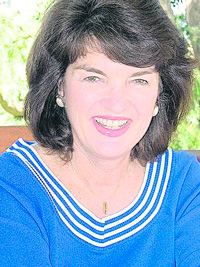| | Published September 17, 2008
| Participatory Democracy in Moraga A conversation with Cherie Grant
| | By Sophie Braccini |  | | Cherie Grant Photo provided | Cherie Grant is very familiar with the community spirit that nourishes the life of the Town of Moraga. As a Council member and Mayor of the small town, and member of many community groups, she saw first-hand how local democracy thrives on the participation of the people. When she began to study the work of French political philosopher and analyst Alexis de Tocqueville, she was struck by the idea that his depiction of the early years of the American Republic resembled what happens on a smaller scale in Moraga. She decided to dig into the subject and produced a thesis called, “Grassroots Efforts In The Town Of Moraga In The Spirit Of Alexis de Tocqueville.”
Grant says, “The principles of participatory democracy that Tocqueville described with enthusiasm are still very much alive in our town today. It dates back to the very creation of the Moraga entity in the early 70’s. People were concerned to have decisions made about their town in Martinez and when development started to sprout around town there was a large grass root movement that led to the incorporation of the town.”
Sophie: Since the involvement is still going on today, what are the primary motivations of the residents?
Cherie: 90% of the issues were and still are property issues, land use, property rights. We have different views of open space and land use that have been confronting each other for years.
Sophie: If we have such profound divisions, what makes us an efficient democracy?
Cherie: Because of geography, we have a better chance to talk to each other, even though we don’t have a town center, we run into people all the time, we do not have a freeway running in the middle of town, it makes it a little more cohesive.
Sophie: The other large component of participatory democracy, as described by Tocqueville, is the important amount of volunteerism that people give to their town; how is volunteerism doing in Moraga?
Cherie: Moraga is basically a town that is run by volunteers, all our commissions, the Town Council, work for absolutely no money, and that’s what built America from its beginning, it volunteerism. The equality of condition and economic homogeneity we have here makes it easier.
Sophie: To make the right decision, citizens need to be informed; do you think that Moragans are informed enough?
Cherie: Things have become so complex that issues are sometimes hard to grasp. One of the reasons we went small was to make things easy, but now even small is very complex, regulations, traffic studies, people feel helpless. May be they feel it is harder to have an impact. Tocqueville said people were active because they could have an impact. That’s why a group like Moraga Citizens Network is important. They have changed things in town; people who had never been able to go to meetings are now involved thanks to that group and participate in local actions. There are many new ways for people to get information like list-serves, or blogs on different subjects. The infrastructure to circulate the information is there, but too many don’t see the need of getting involved. There is a core group, 50 people or so, who really care. New people in town sometimes just assume that everything is fine and they trust the five people on the Council.
Sophie: Current Mayor Lynda Deschambault made participatory democracy and circulation of information one of her main campaign objectives; did she succeed?
Cherie: “She’s truly a pioneer, she tried to have everything online, she sends emails, and spreads information in town. I’m not sure it has increased participation as much as she would have wanted it to be. It is work, and people are busy.”
Sophie: In his essay, Tocqueville attributed a part of the success of the democratic process to “the superiority of their women;”does the gender of a candidate make a difference?
Cherie: Women bring something different to the table, we can’t neglect gender; we need a mix. In our area our women are very confident. They are “the back bone of the community” and they are making a difference every day.
Sophie: You talk a lot about the citizens’ involvement in the area of sustainability; why?
Cherie: That’s the thing that will bring the whole community together. The campus is doing it, it is a global quest, we are all concerned for our children and ourselves. Why would we want to make our town a lesser community for future generations? The issue transcends democrats, republicans; it’s a fabulous opportunity to pull us together.
Sophie: What improvement would you like to see in participatory democracy?
Cherie: The college and the town need to come together more; we need a town center where people can meet, a fun place, a town square where we discuss idea. That physical meeting place could be the Hacienda with some improvements.
Sophie: As you conducted your studies, what surprised you the most?
Cherie: What surprised me the most was the commitment to the town that some people have made for more than 30 years, or others like Parents for a Safer Environment who spend countless hours of outreach and research to protect our children from harm. I knew the spirit of volunteerism was strong, I was surprised to find it so powerful and widespread. |
 | |
 | | | |
